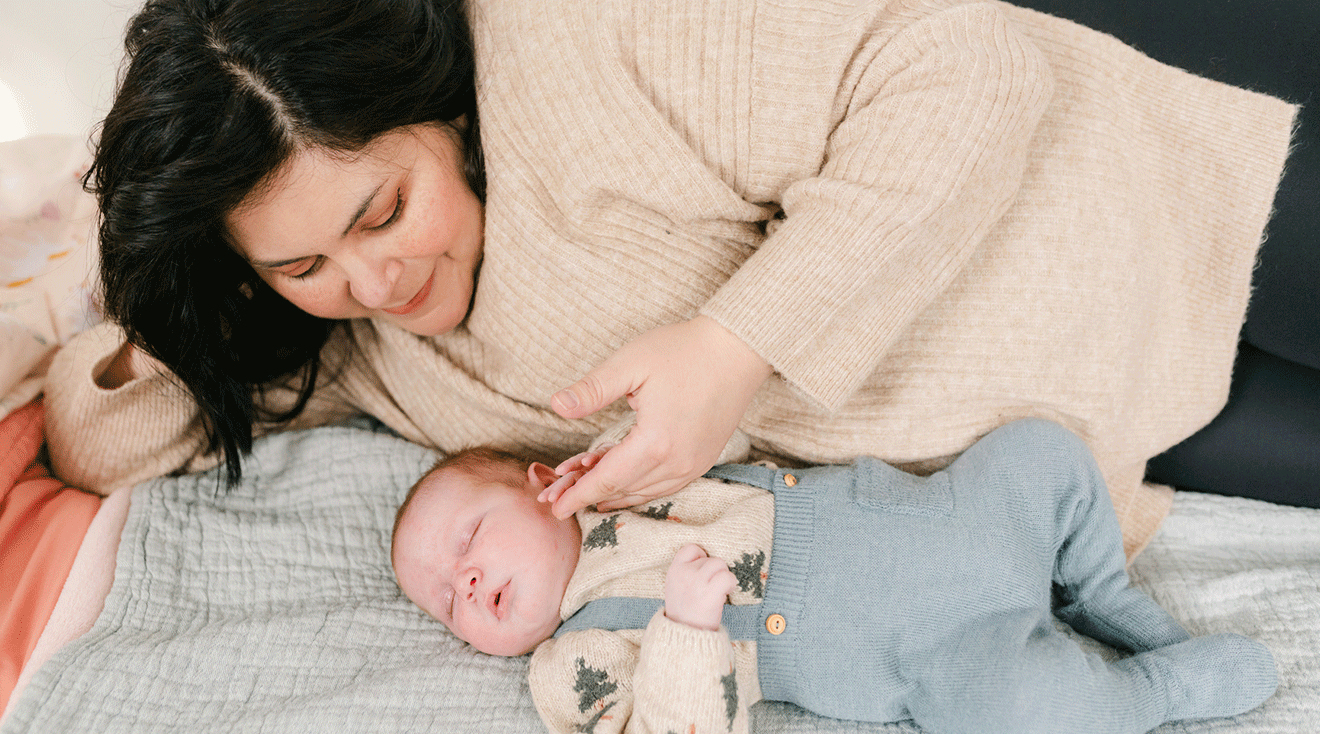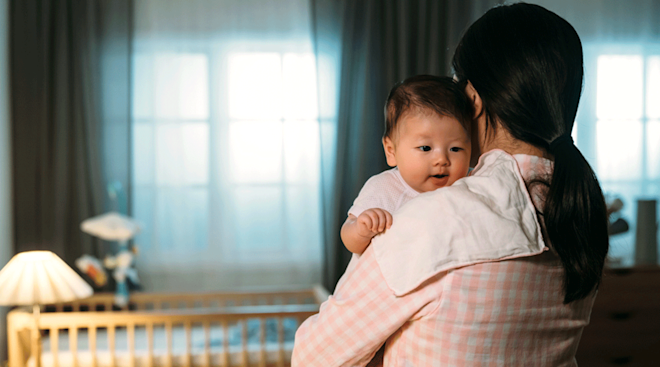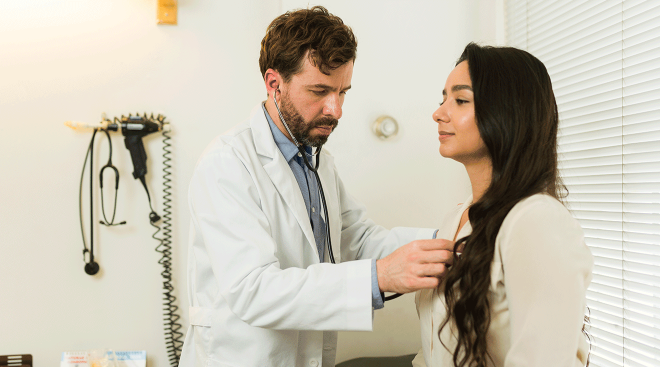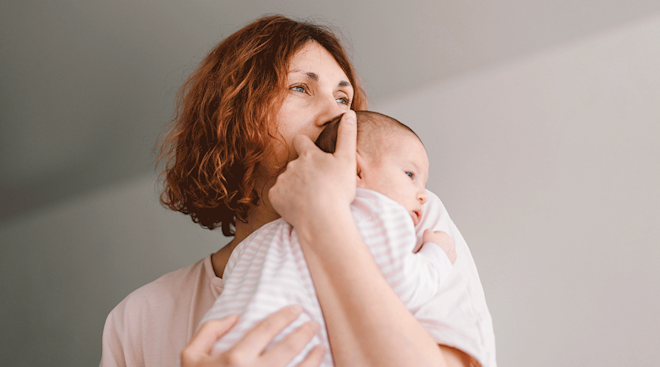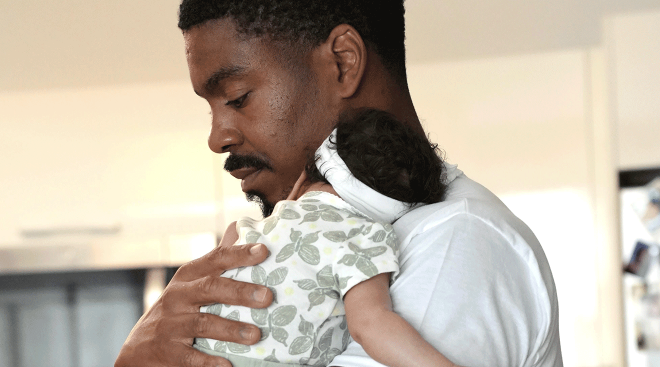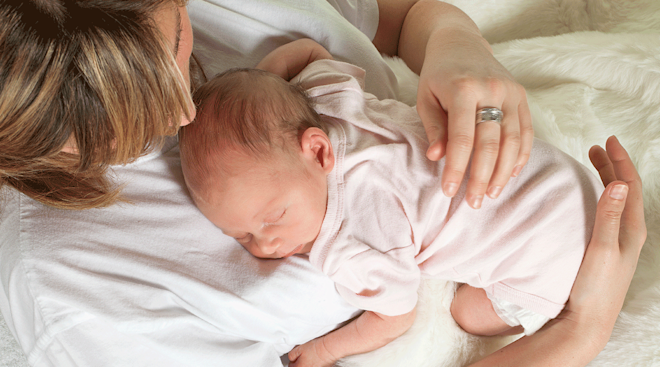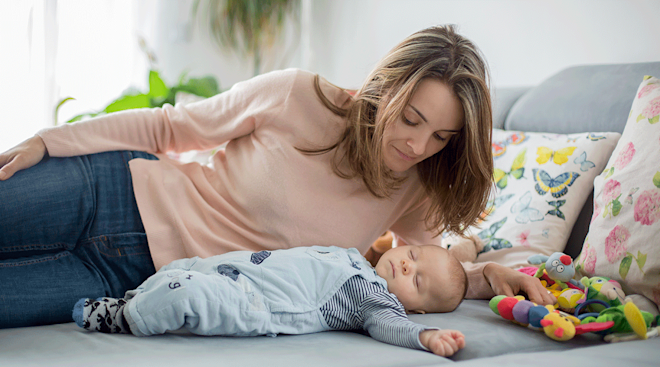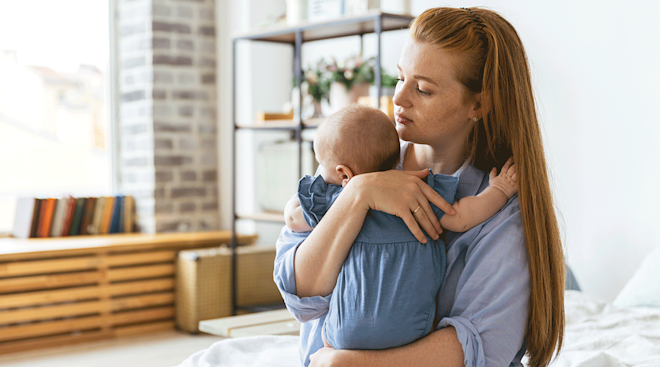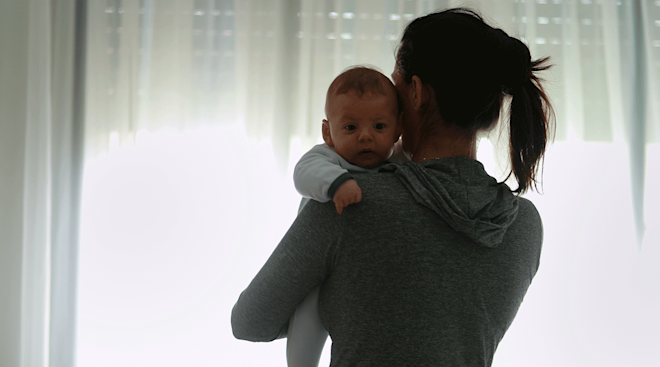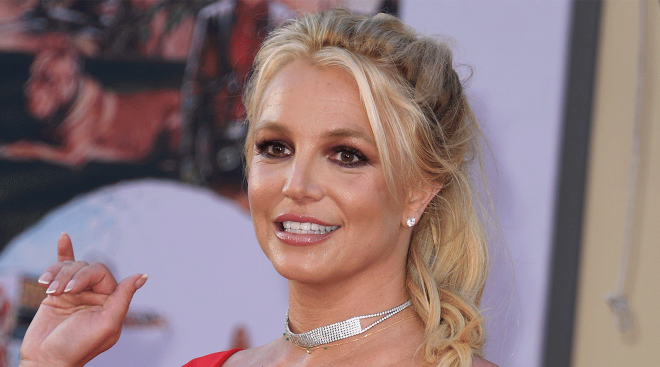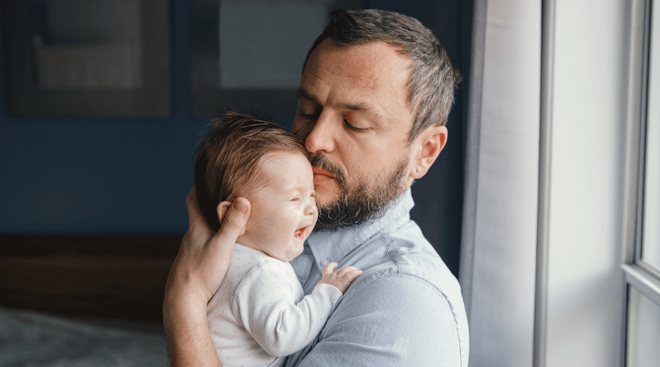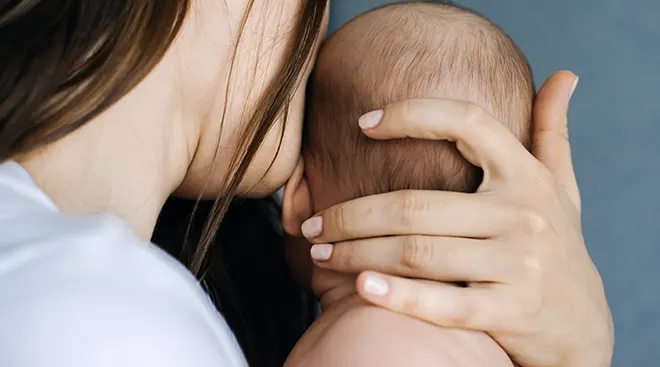How Long Will It Take for Your Hormones to Regulate Postpartum?
Guess what? The same hormones that have left you tired and weepy throughout pregnancy are about to hit you hard once again. Many women experience intense hormonal shifts mere hours after giving birth—their estrogen and progesterone levels dropping faster than they can post their baby’s birth announcement to social media. Meanwhile, other hormones are increasing to help you breastfeed, creating a veritable storm of biological changes.
“After my daughter was born—almost right away—my entire body was shaking,” says Emily Spaeth, PT, DPT, IBCLC, mom of three from Oregon and founder of Be Well Baby PDX. “Next I was sweatier than I had ever been in my life, which lasted a few days. I also noticed that I smelled really different, which my midwife said was a hormonal change meant to help my baby find me more easily.”
Eventually, pregnancy and postpartum hormones do go back to their pre-pregnancy levels, but there’s no official timeline for how long this takes, and some women feel these changes more intensely than others. So how long does it take for hormones to regulate postpartum? Here’s what to know about when and how your hormones change after birth, from which ones are rising and falling to the signs of a true hormonal imbalance after pregnancy.
There are several hormones that change during pregnancy, helping you grow a healthy baby and prepare for labor and delivery. These same hormones change again during the postpartum period, eventually making their way back to normal, pre-pregnancy levels. Sometimes these changes are dramatic, and other times they’re gradual—but, either way, their fluctuations can cause noticeable symptoms in the days, weeks and months after birth.
Estrogen and progesterone
According to Rakhi Dimino, ob-gyn and maternal medical director of the midwifery program at Houston Methodist Willowbrook Hospital, estrogen and progesterone levels plummet immediately after the baby and placenta are delivered, causing mood swings, anxiety, hot flashes, vaginal dryness, and possibly even feelings of depression.
Both of these hormones—which help the uterus and placenta support a growing baby and ensure healthy fetal development—reach sky-high levels during pregnancy. Estrogen increases 100 to 1,000 times the normal level by the third trimester, according to one 2022 study, and progesterone can get as much as 30 times higher between the beginning and end of pregnancy, per the University of Rochester Medical Center. Many experts actually think the sharp declines in estrogen and progesterone so soon after birth play a big part in the development of postpartum depression (PPD).
hCG
Human chorionic gonadotropin (hCG) starts rising in the first trimester of pregnancy and is responsible for telling your body to make more progesterone to support your pregnancy. Though hCG peaks around 10 weeks, it remains higher than normal for the remainder of pregnancy, going back down to almost zero sometime between seven and 60 days postpartum. On its own, falling hCG isn’t blamed for many postpartum woes, but Dimino says it can worsen estrogen and progesterone withdrawal symptoms like mood swings and anxiety.
Cortisol
Cortisol is a hormone produced by the adrenal glands that regulates your stress response, blood sugar and immune response. In pregnancy, cortisol contributes to healthy fetal development, including birth weight. It increases steadily throughout pregnancy, but peaks before labor and then falls dramatically after birth, which can exacerbate depression symptoms, especially in women predisposed to PPD.
Oxytocin and prolactin
These two hormones produced by the pituitary gland don’t plummet after birth—they actually rise. Oxytocin and prolactin are responsible for stimulating breast milk production, so your body ramps up these two hormones to help you feed your new baby. On top of making it possible for you to physically breastfeed, oxytocin and prolactin provide emotional benefits too.
“Oxytocin causes the new mom to have feelings of bonding and attachment to her baby,” says Dimino. “Prolactin can combat feelings of anxiety and make a new mother feel calmer.”
Thyroid hormones
Your body has a higher need for thyroid-stimulating hormone (TSH) during pregnancy, reports the National Institute of Diabetes and Digestive and Kidney Diseases (NIDDK), but those levels begin dropping again after delivery. Although this drop doesn’t usually contribute to emotional symptoms, there’s a slightly higher chance of having thyroid dysfunction in the first 6 to 12 months after giving birth, which may cause symptoms like fatigue, weight gain and sensitivity to extreme temperatures.
It’s important to remember that all postpartum women are affected by these hormonal fluctuations differently, says Dimino, and that individual factors like choosing to breastfeed can speed up or slow down some of these changes.
In general, though, estrogen, progesterone and cortisol begin decreasing immediately following birth, while hCG and thyroid levels decline more steadily. Oxytocin and prolactin, on the other hand, usually increase after birth and can stay elevated for weeks to months if you choose to breastfeed.
Postpartum hormones right after birth
There are significant changes that happen as soon as you deliver, and Greg Marchand, MD, an ob-gyn at Marchand Institute for Minimally Invasive Surgery in Arizona, says these “violent” changes are responsible for many mental health challenges in women, especially in those first few vulnerable days.
“Most of my patients who feel a strong hormonal change remark that it happens soon after delivery, meaning hours after,” he says. “The change can last for months, but it may be very intense that first day.”
Annie Linder, founder of Mom’s First Steps and mom of five from Wisconsin, says she noticed hormonal changes after the recent birth of her fifth baby within a day or two of delivery, including intense emotional swings—going from happily snuggling her newborn one minute to feeling completely overwhelmed, frustrated and out of patience the next. “All of my feelings are a bit more vibrant, even still at nine weeks postpartum,” she says.
It’s not just the swift plummet of hormones like estrogen and progesterone that can leave you swinging wildly from one intense emotion to the next: Marchand says the concurrent rise of oxytocin and prolactin levels creates a cascade of fluctuating hormones that’s closely linked to postpartum mental health disorders like the baby blues, PPD and postpartum psychosis, especially in the first few weeks.
Of course, increasing oxytocin and prolactin levels aren’t all bad; they’re also responsible for helping your body shift from pregnancy to postpartum mode in the hours after delivery. Prolactin is the reason your breasts start producing milk right after birth, while oxytocin stimulates the let-down reflex that actually allows milk to flow from your breasts (and also causes the uterine contractions that will eventually shrink your uterus down to its normal size).
According to Dimino, postpartum hormones can fluctuate in the first few months but generally return to their pre-pregnancy levels three to six months after delivery.
The process often happens in stages. Both Spaeth and Linder say their postpartum experiences taught them that it can take several months to feel normal again. They stress how important it is to remember that this tumultuous time is temporary.
It’s also important to keep in mind that the postpartum hormone timeline is partly influenced by whether or not you breastfeed: “The longer a woman chooses to breastfeed and the more frequently she breastfeeds can prolong the time until the hormone levels return to pre-pregnancy levels,” says Dimino.
This means you may end up with some noticeable hormonal fluctuations whenever you stop breastfeeding or weaning, notes Lauren Tetenbaum, LCSW, a licensed clinical social worker with advanced training in perinatal mental health and a mom of two from New York.
“I remember when I weaned, it took a solid few weeks to feel like myself, and that was doing it slowly,” Tetenbaum shares. “Many of my clients feel depressed or anxious because they wean too quickly and have no idea that it’s because of their hormones, no matter how recent or not their birth was.”
At some point during the postpartum period, your hormones will probably feel off-kilter—that’s normal. But some women experience a hormonal imbalance after giving birth that isn’t normal and warrants a check-in with your provider.
Dimino says some feelings of anxiety, mood swings, irritability and difficulty sleeping are typical in the first two weeks, but more intense symptoms could point to PPD. Per the National Institute of Mental Health, PPD symptoms may feel like:
- Persistent feelings of sadness or depression lasting most of the day for more than two weeks
- Extreme irritability or mood swings
- Feelings of guilt or shame
- Extreme fatigue
- Anxiety or restlessness
- Difficulty concentrating or making decisions
- Trouble sleeping
- Loss of appetite
- Difficulty bonding with baby
The other hormonal imbalance to keep an eye out for is thyroid-related. Thyroid inflammation after giving birth (postpartum thyroiditis) occurs in about 1 out of every 20 women in the first year after delivery. According to the NIDDK, some common symptoms of postpartum thyroiditis include:
- Irritability
- Dry skin
- Sensitivity to heat or cold
- Fatigue
- Difficulty sleeping
- Increased heart rate
It’s incredibly important during these early days and weeks to look for signs of mental health changes. Although you (and everyone else in your life) may be focused on the new baby in front of you, your body is undergoing dramatic changes that are having a direct effect on your mood and health.
If you think you’re struggling physically or mentally, don’t hesitate to reach out to your provider for help. They can counsel you on treatments and coping strategies.
Postpartum psychosis is less common than other postpartum mental health disorders but still a serious cause for concern. Dimino says if you have severe PPD symptoms, hallucinations or a desire to harm yourself or baby, you should seek care immediately—like in an emergency room—so you can get help and support right away rather than waiting for office hours.
Finally, you should also contact your provider if you suspect your thyroid hormones are dysregulated, especially if you have type 1 diabetes or had problems with your thyroid levels before becoming pregnant.
Pregnancy is full of hormonal changes, and so is the postpartum period. The estrogen, progesterone, hCG and cortisol that peaked during pregnancy all decrease swiftly after birth, causing anxiety, mood swings and heightened emotions. Meanwhile, other hormone levels are rising to make breastfeeding possible and help you recover from birth.
This storm of fluctuating hormones is the worst in the first several weeks after delivery, but your hormones may not totally return to normal until several months later. It’s particularly important to be aware of severe mental health changes during the vulnerable postpartum time, and talk to a healthcare provider if you’re having a hard time.
Please note: The Bump and the materials and information it contains are not intended to, and do not constitute, medical or other health advice or diagnosis and should not be used as such. You should always consult with a qualified physician or health professional about your specific circumstances.
Plus, more from The Bump:
Emily Spaeth, PT, DPT, IBCLC, is a physical therapist and international board certified lactation consultant and the founder of Be Well Baby PDX.
Rakhi Dimino, is an ob-gyn and the medical director of the midwifery program at Houston Methodist Willowbrook Hospital. She earned her medical degree from The Ohio State University College of Medicine and Public Health.
Greg Marchand, MD, is an ob-gyn at Marchand Institute for Minimally Invasive Surgery in Arizona. He earned his medical degree from Spartan Health Sciences University in Vieux Fort, St. Lucia.
Lauren Tetenbaum, LCSW, is a licensed clinical social worker with advanced training in perinatal mental health and a mom of two from New York.
Nigerian Medical Journal : Journal of the Nigeria Medical Association, Hormones in pregnancy, 2012
Biological Psychiatry, Estrogen withdrawal increases postpartum anxiety via oxytocin plasticity in the paraventricular hypothalamus and dorsal raphe nucleus, 2020
University of Rochester Medical Center, Progesterone
March of Dimes, Baby blues after pregnancy
StatPearls, Human chorionic gonadotropin, 2025
StatPearls, Physiology, cortisol, 2025
Psychoneuroendocrinology, Maternal serum cortisol levels during pregnancy differ by fetal sex, 2023
BMC Pregnancy and Childbirth, Perinatal maternal depression and cortisol function in pregnancy and the postpartum period: a systematic literature review, 2016
World Health Organization, The Physiological Basis of Breastfeeding
Psychosomatics, Hormonal changes in the postpartum and implications for postpartum depression, 1998
National Institute of Diabetes and Digestive and Kidney Diseases, Thyroid Disease & Pregnancy
University of Rochester Medical Center, How Breastmilk is Made
StatPearls, Oxytocin, 2025
National Institute of Mental Health, Perinatal depression
Learn how we ensure the accuracy of our content through our editorial and medical review process.
Navigate forward to interact with the calendar and select a date. Press the question mark key to get the keyboard shortcuts for changing dates.

































